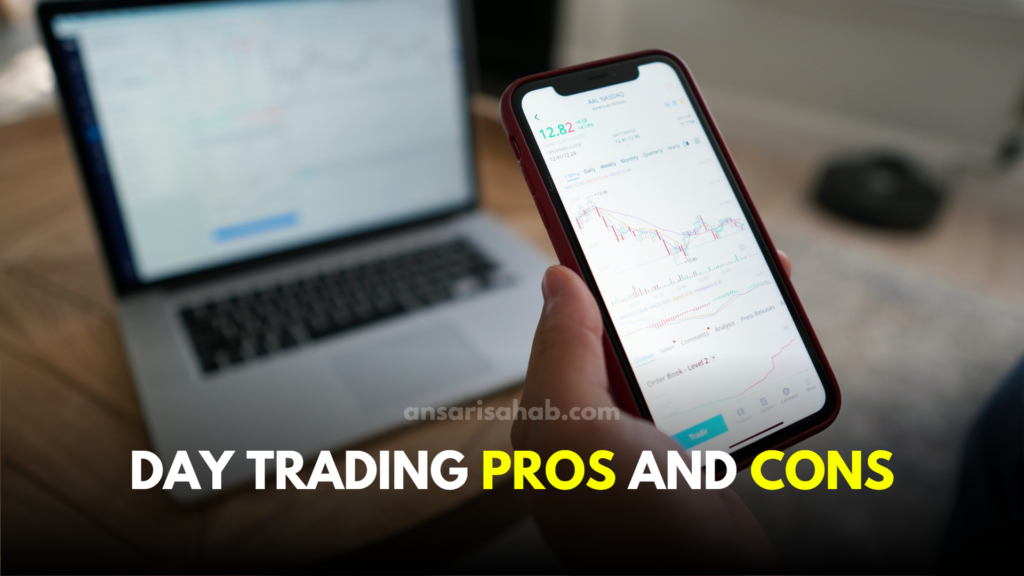Day trading is the buying and selling of securities within the same day. Day traders typically hold their positions for a few minutes or hours at most. They use technical analysis to identify short-term price movements and to make trading decisions. You must know all Day trading strategy.
The Day trading can be a very profitable trading strategy, but it is also very risky. Day traders are exposed to the risk of large losses if the market moves against them. Day trading is also a demanding trading strategy. So, Day traders need to be able to quickly identify and execute trading opportunities.
In this blog post, we will discuss the pros and cons of day trading in detail. We will also provide some tips for those who are considering becoming day traders.
Pros of day trading
- Potential for high profits: Day trading can be a very profitable trading strategy, especially if you are able to identify and ride short-term trends.
- Flexibility: Day trading is a flexible trading strategy. You can trade as much or as little as you want, and you can trade whenever you want.
- Potential to reduce risk: Day trading can help you to reduce your risk by allowing you to take profits quickly.
Cons of day trading
- High risk of loss: Day trading is a high-risk trading strategy. You could lose a lot of money if the market moves against you.
- Demanding: Day trading is a demanding trading strategy. You need to be able to quickly identify and execute trading opportunities.
- Time commitment: Day trading requires a significant time commitment. You need to be able to monitor the markets regularly and to make quick decisions.
- Trading costs: Day trading requires a significant time commitment. You need to be able to monitor the markets regularly and to make quick decisions.
Is day trading right for you?
Day trading is not right for everyone. It is a very high-risk trading strategy, and it is not suitable for beginners. Day trading is also a demanding trading strategy, and it requires a significant time commitment.
If you are considering day trading, it is important to understand the risks involved and to develop a trading plan. It is also important to educate yourself about day trading and to practice with a demo account before trading with real money.
If you are considering becoming a day trader, it is important to be realistic about your expectations. Day trading is not a get-rich-quick scheme. It takes time, practice, and skill to become a successful day trader.
It is also important to have a sufficient amount of capital to start day trading. The minimum capital requirement for day trading is $25,000. However, it is recommended to have at least $50,000 to start day trading.
How to day trade
If you are new to day trading, it is important to start with a demo account. A demo account is a practice account that allows you to trade with virtual money. This is a great way to learn how to day trade without risking any real money.
Once you have learned the basics of day trading, you can start trading with real money. However, it is important to start with a small account and to risk only money that you can afford to lose.
Read Also: Mastering Day Trading: Risks, Rewards, and Strategies
Tips for successful day trading
Here are a few tips for successful day trading:
- Use a trading plan: A trading plan is a set of rules that you will follow when trading. It should include your entry and exit criteria for each trade.
- Use technical analysis: Day traders use technical analysis to identify short-term price movements and to make trading decisions. It is important to have a good understanding of technical analysis before you start day trading.
- Manage your risk: It is important to manage your risk carefully when day trading. One way to do this is to use stop-loss orders. A stop-loss order is an order to sell a security when it reaches a certain price. This helps to limit your losses if the market moves against you.
- Be disciplined: It is important to be disciplined when day trading. This means following your trading plan and sticking to your stop-loss orders.
Day trading strategies
There are many different day trading strategies that you can use. Some of the most popular day trading strategies include:
- Trend following: Trend following strategies involve buying securities that are trending upwards and selling securities that are trending downwards.
- Mean reversion: Mean reversion strategies involve buying securities that have fallen below their average price and selling securities that have risen above their average price.
- Momentum trading: Momentum trading strategies involve buying securities that are showing strong momentum and selling securities that are showing weak momentum.
- Scalping: Scalping strategies involve buying and selling securities very quickly to make small profits.
Read Also: The Dividend Investing Playbook: Strategies for Every Investor
Risk management for Day Trading
Risk management is essential for day traders. The Day traders are exposed to the risk of large losses if the market moves against them. Therefore, it is important to have a risk management plan in place.
One way to manage your risk is to use stop-loss orders. A stop-loss order is an order to sell a security when it reaches a certain price. This helps to limit your losses if the market moves against you.
Another way to manage your risk is to use a risk-reward ratio. This is the ratio of your potential profit to your potential loss on each trade. Aim for a risk-reward ratio of at least 2:1.
Conclusion
Day trading can be a very profitable trading strategy, but it is also very risky. The Day traders are exposed to the risk of large losses if the market moves against them. It is also a demanding trading strategy. Day traders need to be able to quickly identify and execute trading opportunities.
If you are considering day trading, it is important to understand the risks involved and to develop a trading plan. It is also important to educate yourself about day trading and to practice with a demo account before trading with real money.
Additional tips for day traders
- Start with a demo account: A demo account is a practice account that allows you to trade with virtual money. This is a great way to learn how to day trade without risking any real money.
- Paper trade: Paper trading is a way to practice day trading with real-time market data, but without risking any real money. You can use a paper trading platform to track your progress and to learn from your mistakes.
- Educate yourself: There are many resources available to help you learn about day trading. You can find books, articles, and online courses on the subject. It is important to educate yourself before you start day trading with real money.
- Find a mentor: A mentor is someone who can teach you about day trading and help you to develop your own trading strategy. A mentor can be a valuable resource for new day traders.
Day trading is a challenging but rewarding trading strategy. If you are willing to put in the hard work and dedication, you can become a successful day trader.
Day trading is not a get-rich-quick scheme. It takes hard work, dedication, and discipline to become a successful day trader. If you are willing to put in the effort, day trading can be a rewarding trading strategy.
FAQ (Frequently Asked Questions)
Day trading is the buying and selling of securities within the same day. Traders aim to profit from short-term price movements. They use technical analysis and execute trades quickly.
Yes, day trading has the potential for high profits, especially when identifying short-term trends. However, it also comes with a high risk of loss.
Day trading offers the potential for high profits, flexibility in trading, and the ability to reduce risk by taking quick profits.
Day trading is high-risk, demanding, and time-consuming. It also involves trading costs.
Day trading is not recommended for beginners due to its high risk and complexity. It requires experience and skill.
Start with a demo account to practice with virtual money, then transition to a small real account when you’re ready.
Use a trading plan, understand technical analysis, manage risk with stop-loss orders, and maintain discipline.
Popular strategies include trend following, mean reversion, momentum trading, and scalping.
Use stop-loss orders to limit losses and aim for a risk-reward ratio of at least 2:1 for each trade.
No, day trading is not a get-rich-quick scheme. Success requires time, practice, discipline, and a realistic approach.









